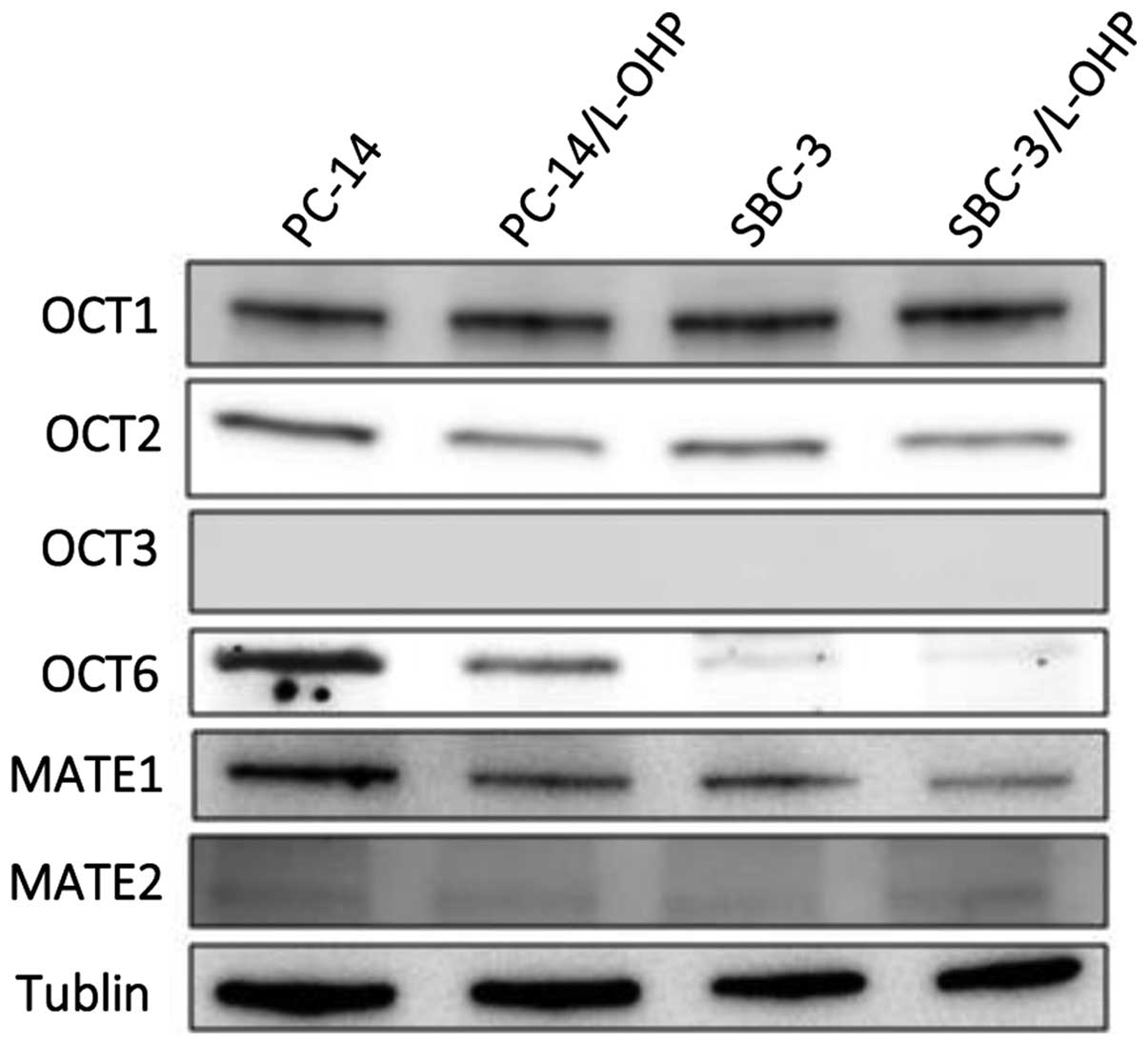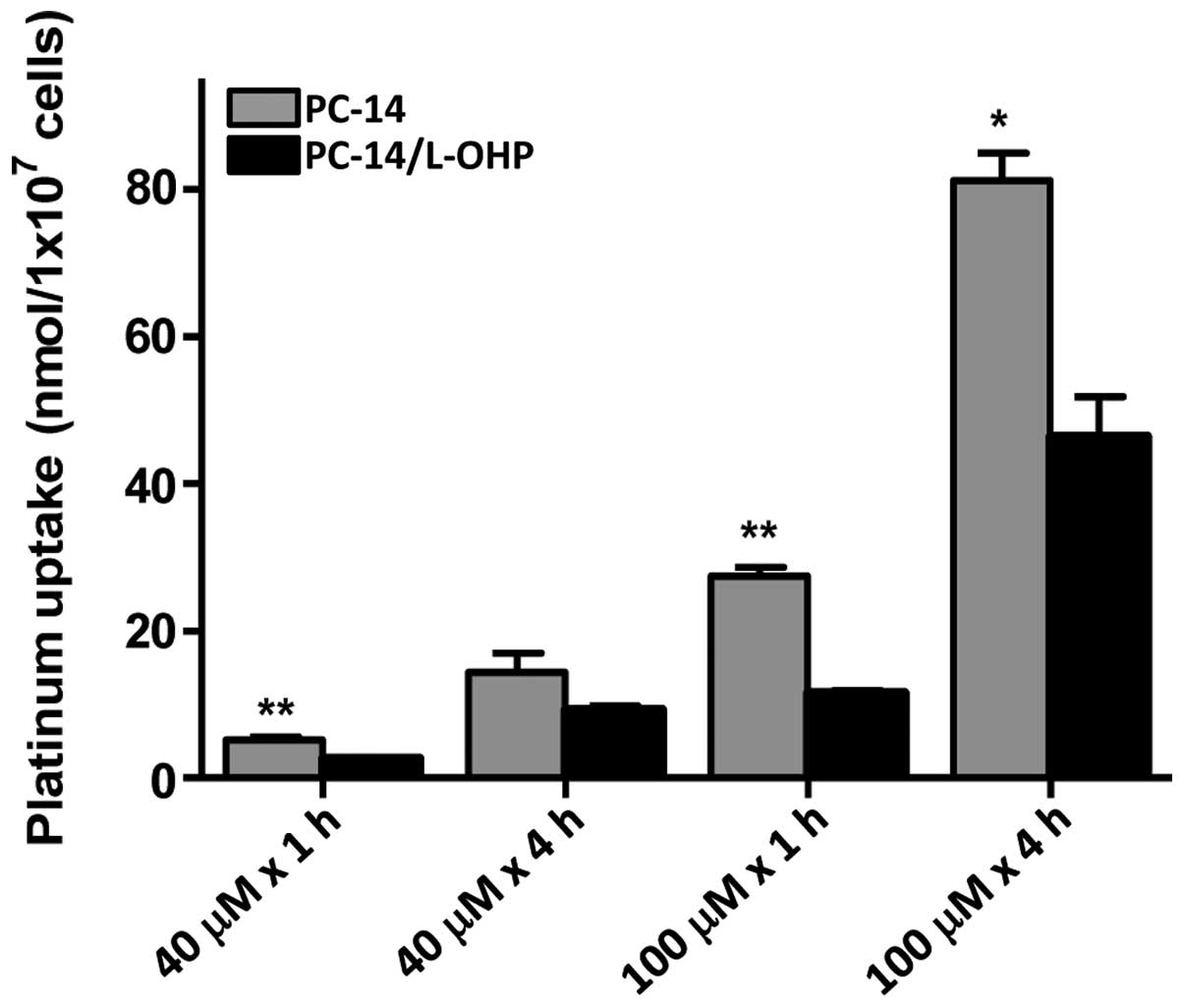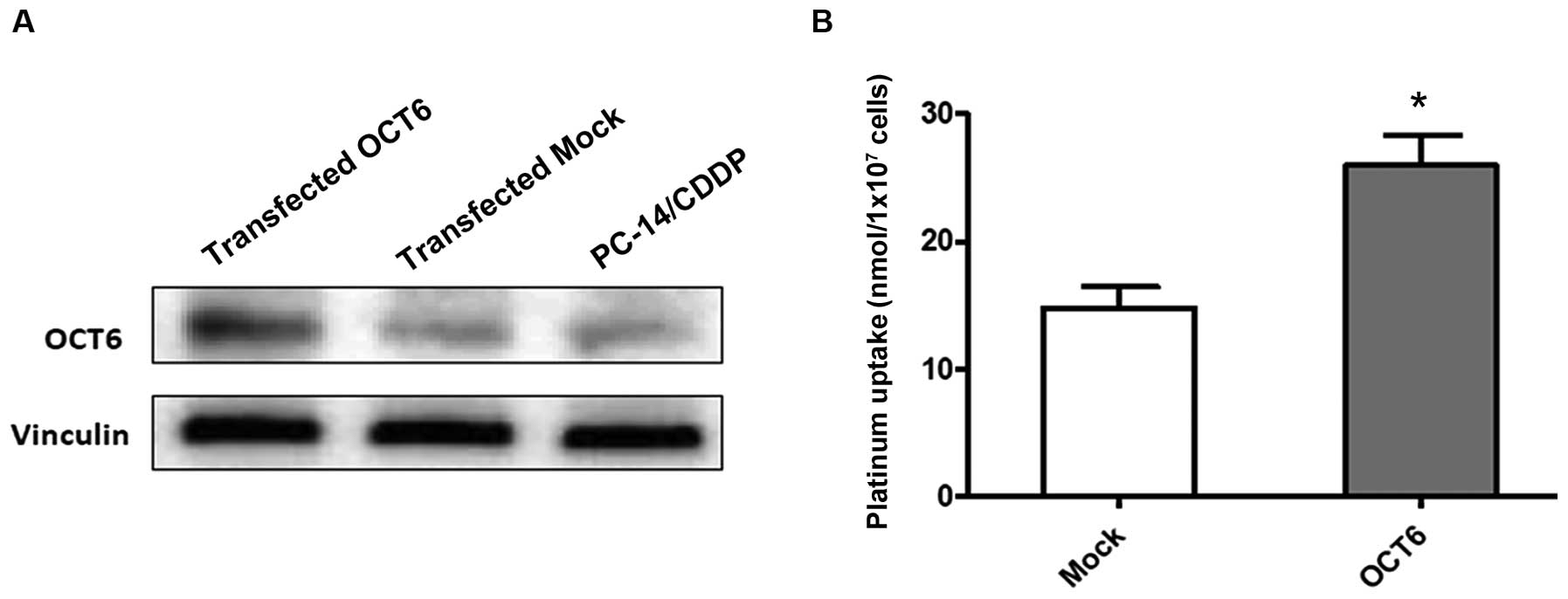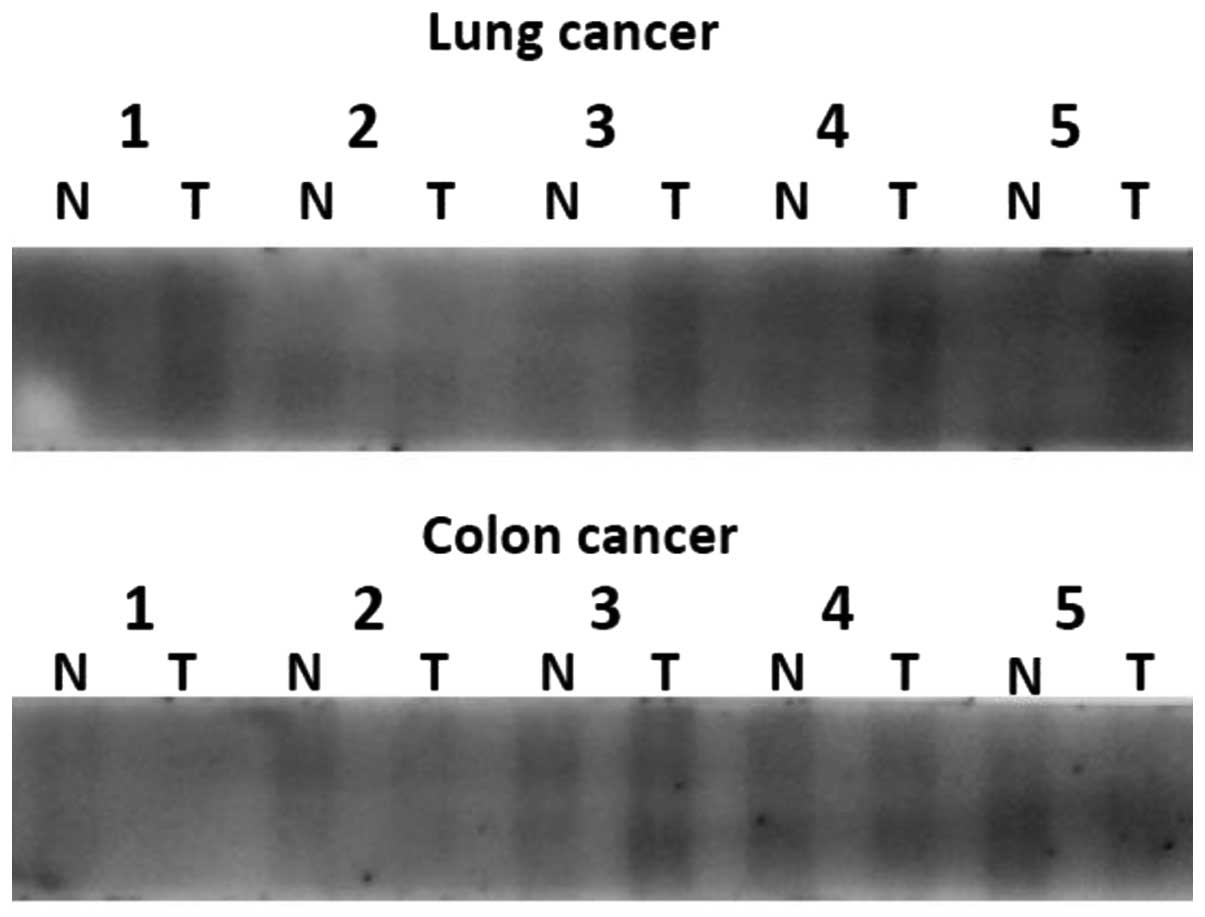|
1
|
Sculier JP, Berghmans T and Meert AP:
Advances in target therapy in lung cancer. Eur Respir Rev.
24:23–29. 2015. View Article : Google Scholar : PubMed/NCBI
|
|
2
|
Heinemann V, Douillard JY, Ducreux M and
Peeters M: Targeted therapy in metastatic colorectal cancer - an
example of personalised medicine in action. Cancer Treat Rev.
39:592–601. 2013. View Article : Google Scholar : PubMed/NCBI
|
|
3
|
Kelland L: The resurgence of
platinum-based cancer chemotherapy. Nat Rev Cancer. 7:573–584.
2007. View
Article : Google Scholar : PubMed/NCBI
|
|
4
|
Dasari S and Tchounwou PB: Cisplatin in
cancer therapy: Molecular mechanisms of action. Eur J Pharmacol.
740:364–378. 2014. View Article : Google Scholar : PubMed/NCBI
|
|
5
|
Oguri T, Fujiwara Y, Isobe T, Katoh O,
Watanabe H and Yamakido M: Expression of γ-glutamylcysteine
synthetase (γ-GCS) and multidrug resistance-associated protein
(MRP), but not human canalicular multispecific organic anion
transporter (cMOAT), genes correlates with exposure of human lung
cancers to platinum drugs. Br J Cancer. 77:1089–1096. 1998.
View Article : Google Scholar : PubMed/NCBI
|
|
6
|
Oguri T, Fujiwara Y, Miyazaki M, Takahashi
T, Kurata T, Yokozaki M, Ohashi N, Isobe T, Katoh O and Yamakido M:
Induction of γ-glutamylcysteine synthetase gene expression by
platinum drugs in peripheral mononuclear cells of lung cancer
patients. Ann Oncol. 10:455–460. 1999. View Article : Google Scholar : PubMed/NCBI
|
|
7
|
Oguri T, Isobe T, Suzuki T, Nishio K,
Fujiwara Y, Katoh O and Yamakido M: Increased expression of the
MRP5 gene is associated with exposure to platinum drugs in lung
cancer. Int J Cancer. 86:95–100. 2000. View Article : Google Scholar : PubMed/NCBI
|
|
8
|
Oguri T, Isobe T, Fujitaka K, Ishikawa N
and Kohno N: Association between expression of the MRP3 gene and
exposure to platinum drugs in lung cancer. Int J Cancer.
93:584–589. 2001. View
Article : Google Scholar : PubMed/NCBI
|
|
9
|
Koepsell H, Lips K and Volk C:
Polyspecific organic cation transporters: Structure, function,
physiological roles, and biopharmaceutical implications. Pharm Res.
24:1227–1251. 2007. View Article : Google Scholar : PubMed/NCBI
|
|
10
|
Zhang S, Lovejoy KS, Shima JE, Lagpacan
LL, Shu Y, Lapuk A, Chen Y, Komori T, Gray JW, Chen X, et al:
Organic cation transporters are determinants of oxaliplatin
cytotoxicity. Cancer Res. 66:8847–8857. 2006. View Article : Google Scholar : PubMed/NCBI
|
|
11
|
Ciarimboli G, Ludwig T, Lang D, Pavenstädt
H, Koepsell H, Piechota HJ, Haier J, Jaehde U, Zisowsky J and
Schlatter E: Cisplatin nephrotoxicity is critically mediated via
the human organic cation transporter 2. Am J Pathol. 167:1477–1484.
2005. View Article : Google Scholar : PubMed/NCBI
|
|
12
|
Kunii E, Oguri T, Kasai D, Ozasa H, Uemura
T, Takakuwa O, Ohkubo H, Takemura M, Maeno K and Niimi A: Organic
cation transporter OCT6 mediates cisplatin uptake and resistance to
cisplatin in lung cancer. Cancer Chemother Pharmacol. 75:985–991.
2015. View Article : Google Scholar : PubMed/NCBI
|
|
13
|
Kim ES, Lee JJ, He G, Chow CW, Fujimoto J,
Kalhor N, Swisher SG, Wistuba II, Stewart DJ and Siddik ZH: Tissue
platinum concentration and tumor response in non-small-cell lung
cancer. J Clin Oncol. 30:3345–3352. 2012. View Article : Google Scholar : PubMed/NCBI
|
|
14
|
Yokoo S, Yonezawa A, Masuda S, Fukatsu A,
Katsura T and Inui K: Differential contribution of organic cation
transporters, OCT2 and MATE1, in platinum agent-induced
nephrotoxicity. Biochem Pharmacol. 74:477–487. 2007. View Article : Google Scholar : PubMed/NCBI
|
|
15
|
Yonezawa A and Inui K: Organic cation
transporter OCT/SLC22A and H(+)/organic cation antiporter
MATE/SLC47A are key molecules for nephrotoxicity of platinum
agents. Biochem Pharmacol. 81:563–568. 2011. View Article : Google Scholar : PubMed/NCBI
|
|
16
|
Tashiro A, Tatsumi S, Takeda R, Naka A,
Matsuoka H, Hashimoto Y, Hatta K, Maeda K and Kamoshida S: High
expression of organic anion transporter 2 and organic cation
transporter 2 is an independent predictor of good outcomes in
patients with metastatic colorectal cancer treated with
FOLFOX-based chemotherapy. Am J Cancer Res. 4:528–536.
2014.PubMed/NCBI
|
|
17
|
Naka A, Takeda R, Shintani M, Ogane N,
Kameda Y, Aoyama T, Yoshikawa T and Kamoshida S and Kamoshida S:
Organic cation transporter 2 for predicting cisplatin-based
neoadjuvant chemotherapy response in gastric cancer. Am J Cancer
Res. 5:2285–2293. 2015.PubMed/NCBI
|
|
18
|
Okabe M, Unno M, Harigae H, Kaku M, Okitsu
Y, Sasaki T, Mizoi T, Shiiba K, Takanaga H, Terasaki T, et al:
Characterization of the organic cation transporter SLC22A16: A
doxorubicin importer. Biochem Biophys Res Commun. 333:754–762.
2005. View Article : Google Scholar : PubMed/NCBI
|
|
19
|
Zhou C, Wu YL, Chen G, Feng J, Liu XQ,
Wang C, Zhang S, Wang J, Zhou S, Ren S, et al: Final overall
survival results from a randomised, phase III study of erlotinib
versus chemotherapy as first-line treatment of EGFR
mutation-positive advanced non-small-cell lung cancer (OPTIMAL,
CTONG-0802). Ann Oncol. 26:1877–1883. 2015. View Article : Google Scholar : PubMed/NCBI
|
|
20
|
Gong S, Lu X, Xu Y, Swiderski CF, Jordan
CT and Moscow JA: Identification of OCT6 as a novel organic cation
transporter preferentially expressed in hematopoietic cells and
leukemias. Exp Hematol. 30:1162–1169. 2002. View Article : Google Scholar : PubMed/NCBI
|
|
21
|
Minematsu T and Giacomini KM: Interactions
of tyrosine kinase inhibitors with organic cation transporters and
multidrug and toxic compound extrusion proteins. Mol Cancer Ther.
10:531–539. 2011. View Article : Google Scholar : PubMed/NCBI
|


















